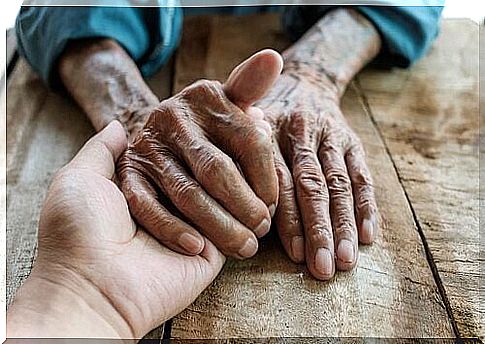Care Syndrome And Its Unintended Victim

How would you like to have a job that takes up 24 hours, every day, throughout the year? This is the case for many adults who have to take care of another person who is dependent on them. However, under certain circumstances, this role can give rise to something called care syndrome .
The constant attention that the caregiver must give to the addicted person can generate times of significant stress. This is one of the main effects of care syndrome, and it can continuously damage the quality of help a provider can offer.
It is a disorder that, although not very well known, has several symptoms and very serious consequences, both physical and psychological. It has many properties that can be similar to burnout syndrome or stress at work. A similar syndrome in health care workers is called compassion fatigue .
Caregiver and dependent
These people tend to be responsible for others who need constant help. The syndrome manifests itself in adults who have a responsibility to care for others who have a certain degree of neurological or mental impairment. For example, patients with advanced Alzheimer’s require this commitment and also continuous supervision.
One of the main characteristics of care syndrome is mental and physical exhaustion in the caregiver. Their exhaustion is so severe that it greatly affects their psychological, social and physical abilities. In addition, if the caregiver and the patient live under the same roof, fatigue occurs more quickly and is more severe. This is because it becomes almost impossible not to make care the center of your life.

An enforced role
In general, a person does not voluntarily become a caregiver. In the vast majority of cases , this role is usually enforced by the different circumstances of each individual or family. These adults suddenly find that they have been imposed an extra “load” that they did not expect at all.
Some people are better equipped to face this new situation than others, and can perform it more naturally. Others do not have as many resources. They find themselves immersed, from the beginning, in a challenge that they consider almost impossible . They feel completely overwhelmed by everything, and see their new role as unbearable and burdensome. Like a cross they feel they have to carry, but one that will wear them out completely. In either case, the addict becomes the center of their new life. Eventually, they will end up consuming most of their time and energy.
The new routine
And taking care of someone without rest is a process fraught with wear and tear. But it gets even harder if you have to sacrifice yourself in the deal. In most cases, the caregiver must gradually turn to the new tasks they have been given. They need to create a new routine where the person in their care becomes their priority. Little by little, the caregiver stops having time for himself. They set aside their independence and sacrifice their needs and desires.
Leisure time
Their free time is gradually reduced and they give up all their hobbies and pastimes. Their time for leisure activities is sacrificed to preserve family relationships. In addition, the caregiver’s circle of friends is getting smaller and smaller. This is of course due to the fact that they spend less and less time with their friends, as they now have a responsibility they have never had before. They may end up being completely isolated from the outside world.

Family
Family relationships can sometimes suffer, as a result of a new person joining the already established household. New conflicts often arise as a result. Irritability begins to permeate the house, and the number of quarrels and discussions increases. There are also new tasks that must be distributed and performed by members of the household. This is not something that often pleases everyone in the household.
Job
When it comes to work, there may be an increase in the number of days of absence. They may begin to neglect their duties, or even give up their job altogether. As a result, the financial situation worsens. This can trigger a physical and mental overload in addition to the already difficult situation.
Far from being reduced, the pressure and the continuous struggle increase from day to day. It is becoming more and more difficult for the caregiver to handle their newly acquired role with freshness and enthusiasm. The caregiver begins to suffer from chronic fatigue, insomnia and mood swings. This gives rise to feelings of constant sadness, anxiety and worry.
The changes that occur in the caregiver’s life are varied. It can affect them in the short, medium or long term.
Care syndrome how it starts
Giving care becomes a routine in which the nurse is immersed, without them paying enough attention to what they are doing. Stress, anxiety, fatigue and exhaustion come as a result. This is the typical scenario where care syndrome can develop. Irritability and impatience increase, as does lack of motivation, and even violence can occur.
As a result , a number of negative attitudes and feelings may begin to be directed at the addicted person. The caregiver may even reject the person who is dependent on them. You will now see how important it is to prevent the development of care syndrome. Not only because it negatively affects the caregiver, but also because it can reduce the addict’s quality of life.
This double effect must be solved. You should seek the help of experienced professionals to begin with. You should also prioritize seeking support for all the tasks involved in caring for the dependent person. Both the caregiver and the dependent person are just as important as each other. Because of this, the needs of both persons should be taken into account for a satisfactory solution to the situation.









